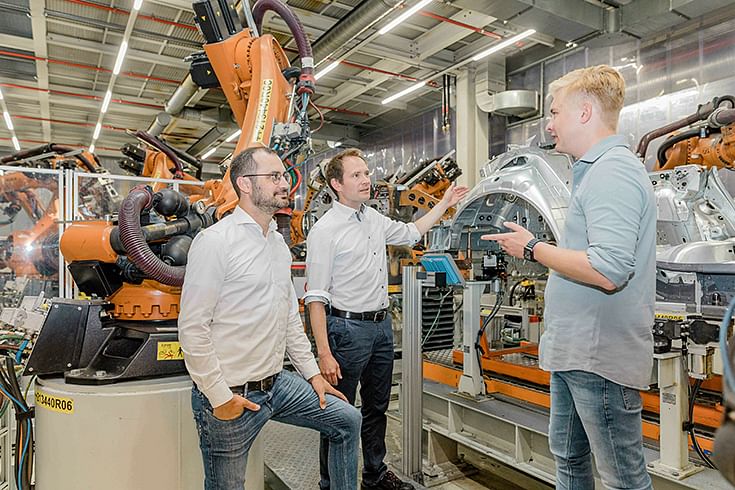Audi begins using AI system for quality control of spot welds
Test use of artificial intelligence for series production underway; using AI, the carmaker analyses around 1.5 million spot welds on 300 vehicles each shift at its Neckarsulm site.
Audi is pushing forward with the digitalisation of its production activities. Following a successful pilot project, the German luxury carmaker has begun rolling out an artificial intelligence (AI) system for quality-control of spot welds in car body construction.
The AI was developed and tested beforehand at the Neckarsulm plant. By the end of the year, the technical infrastructure for the use of AI will be installed at three other Volkswagen Group locations. The project also serves as a use case for the Automotive Initiative 2025 (AI25) launched by Audi.
Using artificial intelligence, Audi analyses around 1.5 million spot welds on 300 vehicles each shift at its Neckarsulm site. By comparison, until recently, production staff used ultrasound to manually monitor the quality of resistance spot welding (abbreviated WPS in German) processes based on random analyses. With the ultrasound method, they checked around 5,000 spot welds per vehicle. By applying AI, employees can now focus on possible anomalies. This new approach will enable them to control quality more efficiently and in a more targeted way.
Preparations for using the technology at other plants in the Volkswagen Group have already begun. For example, the technical infrastructure for AI use is currently being installed at Audi Brussels. The Volkswagen plant in Emden is scheduled to install the necessary infrastructure this year, as will Audi’s headquarters in Ingolstadt. To install the technical infrastructure at these locations, the team of experts is currently identifying differences in weld settings in order to retrain the AI model accordingly.
 A team led by project managers Mathias Mayer (left) and Andreas Rieker (centre), seen exchanging ideas with data analyst Nick Hauck, developed an AI for quality control in resistance spot welding (WPS) at the Neckarsulm site.
A team led by project managers Mathias Mayer (left) and Andreas Rieker (centre), seen exchanging ideas with data analyst Nick Hauck, developed an AI for quality control in resistance spot welding (WPS) at the Neckarsulm site.
The data generated through use of the AI can be used to optimize other processes in the future. As an example, the Audi team is currently working on using the data as a basis for predictive maintenance down the road. “Digitalized assembly lines are a foundation for Audi’s vision for the production of the future: As part of our 360factory production strategy, we will make production at Audi locations worldwide even more efficient. In this regard, the use of artificial intelligence in series production promises huge potential,” says Gerd Walker, Audi Board Member for Production and Logistics.
Close coordination with DGQ, Fraunhofer IAO, Fraunhofer IPA
In order to make the process audit- and certification-proof, development at the Neckarsulm location was carried out in close coordination with the German Association for Quality (DGQ), the Fraunhofer Institute for Industrial Engineering (IAO), and the Fraunhofer Institute for Manufacturing Engineering and Automation (IPA).
This approach reflects the fact that there are currently no standards or certifications issued by an independent body for AI applications to date. “This means that, for example in manufacturing, it is possible to conclusively demonstrate how the result of an AI-based test comes about,” explained WPS-Analytics project managers Mathias Mayer and Andreas Rieker. Audi has also developed an AI guide for production with the Fraunhofer Institutes IAO and IPA.
The project ‘WPS-Analytics’ also serves as a use case for the Automotive Initiative 2025 (AI25) launched by Audi. The initiative aims to establish a competence network for digital factory transformation and innovation. Audi wants to leverage digitalisation to make production and logistics more flexible and efficient. On its way to becoming a smart factory, Audi and partners from science and the IT industry are testing digital solutions to produce premium vehicles in a real manufacturing environment in Neckarsulm to deploy them in series production later.
RELATED ARTICLES
Autoliv Plans JV for Advanced Safety Electronics With China’s HSAE
The new joint venture, which is to be located strategically near Shanghai and close to several existing Autoliv sites in...
JLR to Restart Production Over a Month After September Hacking
Manufacturing operations at the Tata Group-owned British luxury car and SUV manufacturer were shut down following a cybe...
BYD UK Sales Jump 880% in September to 11,271 units
Sales record sets the UK apart as the largest international market for BYD outside of China for the first time. The Seal...






 By Autocar Professional Bureau
By Autocar Professional Bureau
 11 Jul 2023
11 Jul 2023
 5576 Views
5576 Views








 Ajit Dalvi
Ajit Dalvi




